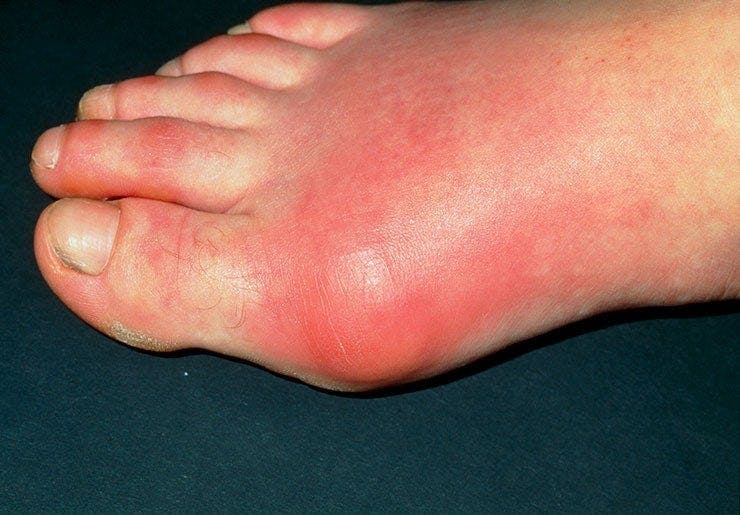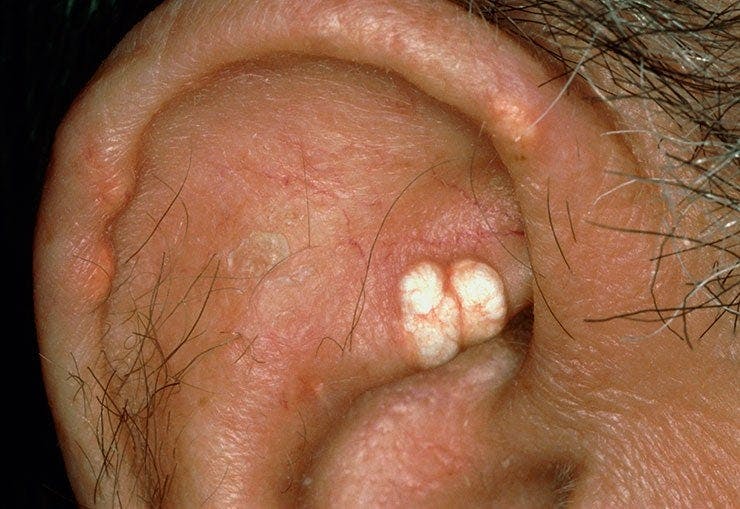Gout
Edited by Dr Claudia Pastides, 18th December 2019
What is Gout?
Gout is a type of arthritis caused by a build up of tiny crystals in the joints. These crystals happen as a result of raised uric acid levels in the blood, caused either by the kidneys not filtering uric acid out of the body properly or by the body making too much.
Uric acid is a waste product made by the body. It comes from the breakdown of purines, found in many different food types and drinks, from red meat and seafood through to beer.
People with raised uric acid levels can have no symptoms whatsoever, however others will have gout flare ups (or gout attacks) set off by knocking or injuring a joint (i.e. stubbing their toe), feeling unwell or if they’re under a lot of stress.
Gout should be diagnosed and treated early by a doctor. Speak with a doctor today if you believe you may be suffering from this condition.
Signs of gout
In over three quarters of people with gout, their first ever episode tends to be in the big toe. The typical signs include:
- Severe pain in the joint
- Swollen joint
- Red or hot joint

Gout can also affect other joints, such as the fingers, wrists, elbows and knees, as well as other joints in the feet. It presents much the same way in these joints as it does in the big toe, with pain, redness and swelling.
Between half and three quarters of people with long-term gout also get little white bumps beneath the skin, called tophi. These tophi tend to happen in the areas of the body that are coldest, including the ears, fingertips and elbows.

Flare up of gout
People with a diagnosis of gout tend to go weeks, months (sometimes even years) without any symptoms. However, flare ups do happen in the majority and usually within a year.
The good news is that, with medication, the pain of a gout attack is significantly reduced within the first 24 hours and most people’s symptoms are gone within 2 to 7 days.
A flare up of gout will usually get better by itself within 2 weeks, but recurrent untreated attacks can lead to permanent joint damage and disability, so it is important if anyone is worried they might have gout that they speak to a doctor about it and get flare ups treated.
Sometimes it can be hard to differentiate gout from an infected joint. Infected joints often require urgent medical treatment, so anyone with a painful joint as well as a high fever or that’s generally feeling unwell, should speak to a doctor as soon as possible.
Gout treatment
Gout is best treated with a combination of self-care and medication.
Self-care includes:
- resting and elevating the part of the body where the inflamed joint is
- keeping the joint cool by keeping it uncovered
- applying an ice pack to the affected joint
- keeping well hydrated (unless drinking is limited by other health conditions, such as in some kidney or heart problems)
- weight loss (if appropriate), increased exercise, a healthy balanced diet and minimal alcohol consumption can all help to reduce the recurrence of attacks - so it is important all these are discussed with a doctor
There are 2 different types of drug treatment; treatment for flare ups and treatment to prevent flare ups from happening.
For gout flare ups - the mainstay of treatment is either with nonsteroidal anti-inflammatory drugs (NSAID’s), such as ibuprofen, or a gout-specific drug called colchicine. Taking paracetamol for some extra pain relief on top can be helpful.
Some people cannot use NSAIDs or colchicine and in those cases oral steroids might be prescribed or the affected joint will be injected with a steroid.
For gout prevention - If a person keeps having gout flare ups or is considered at risk of recurrent attacks, their doctor will recommend medication that they take daily in order to reduce the uric acid levels in the body and prevent flare ups from happening.
Drugs that prevent gout attacks include allopurinol and febuxostat. Often these will be started after a gout flareup has completely resolved, together with NSAIDs or colchicine (as sometimes starting preventative treatment will cause a gout flare up) and following blood tests.
Once on preventative medicine - treatment is usually lifelong and blood tests will be done at least once a year, to keep an eye on the uric acid levels.
Frequently asked questions about gout
1. What is the main cause of gout?
The main cause of gout is having high levels of uric acid in the blood. Raised uric acid levels can happen as a result of consuming too many purine-rich things (such as meat and drinking beer), or because the kidneys aren’t excreting uric acid out of the body well enough.
2. What is the best treatment for gout?
NSAIDs (such as Ibuprofen) or colchicine are effective treatments for gout flare ups. Aspirin is not usually advised.
For people who cannot tolerate NSAIDs or colchicine, oral or injected steroids can be very helpful.
Allopurinol and febuxostat are used in the prevention of gout.
3. How do you treat and prevent gout?
The treatment and prevention of gout rely on a combination of drugs and self-care measures, as mentioned under ‘Gout treatment’ section higher up.
4. What foods cause gout?
A person’s diet is incredibly important because uric acid is a breakdown product of purines and purines come from what we eat. Reducing the intake of purines can help to prevent gout.
Foods high in purines include: offal (liver, kidneys, sweetbreads), game (pheasant, rabbit, venison), oily fish, seafood (shellfish, mussels etc), meat and yeast extracts (Marmite, beer, gravy).
For more information on what foods and drinks increase the risk of gout, check out this useful leaflet from the UK gout society.
5. Will gout go away by itself?
A gout flare up will go away by itself, but it will take around 2 weeks and be very painful. The other problem is that recurrent untreated gout flare ups can lead to permanent joint damage, so it is best to take medication for gout attacks. This not only greatly reduces how many days someone will be in pain, but also reduces the chances of joint damage.
Once someone is diagnosed with gout, it is likely they’ll need to take gout-preventing medication for life. Some people do however come off medication successfully, in particular if they’ve addressed the things that were putting them at risk of gout (i.e. they’ve lost weight, changed their diet) and they’ve had a normal blood uric acid level for years.
6. What is the first sign of gout?
The first sign of gout is typically a very suddenly severely painful, red, hot and swollen base of the big toe.
If you think you might be suffering from gout, contact a GP today to discuss it.
The information provided is for educational purposes only and is not intended to be a substitute for professional medical advice, diagnosis, or treatment. Seek the advice of a doctor with any questions you may have regarding a medical condition. Never delay seeking or disregard professional medical advice because of something you have read here.
